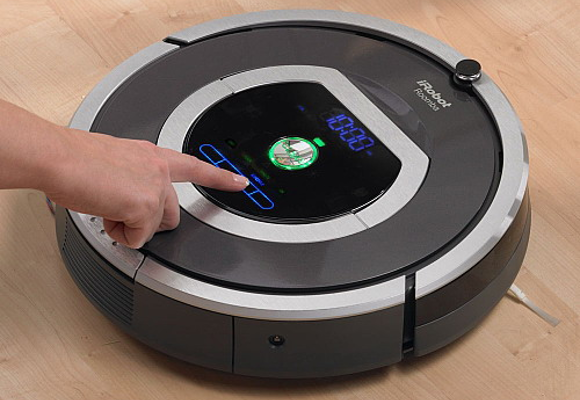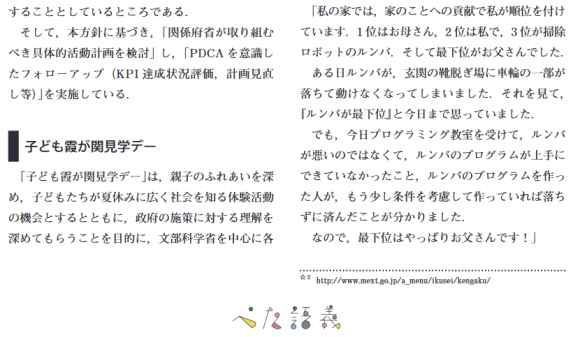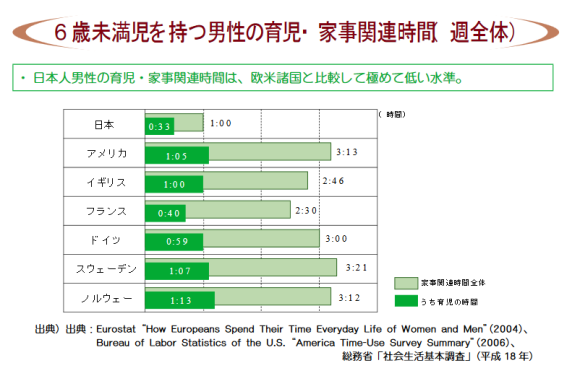
If your child has a better relationship with the robotic vacuum cleaner than with you, then you might have a problem.
We’ve seen before that the typical demands of the Japanese workplace and salaryman lifestyle don’t often allow for the best work-life balance. When parents are expected to be at work early in the morning, then don’t come home until their children are asleep, that leaves very little time for bonding.
And in Japan, where men are still expected to be the family breadwinner, that can mean fathers are little more than ghosts to their children—someone whose vague presence can be felt about the house and about whom stories are told, but rarely encountered in the flesh.
One tweet that has been making the rounds on Twitter in Japan sums up this sentiment perfectly. It’s a story from a Japanese fifth-grade girl who was attending a programming workshop using LEGO Mindstorm.
What should have been just a fun little session ended up being a disillusioning experience for her.
▼ Screenshot of the original text as published in the
Japanese tech magazine Pedagogi. (Translation below.)
Information Processing Society of Japan
“The order of who contributes the most at my house is: #1 my mom. #2 me. #3 the Roomba robot that cleans our house. And the very last one is my dad. One day, one of the Roomba’s wheels got stuck in the floor in our home’s entryway, and it couldn’t move. Ever since I saw that, I thought that the Roomba was the worst contributor to the house.
“But now, after taking this programming workshop today, I’ve learned that it wasn’t the Roomba that was bad, it’s the Roomba’s programming that wasn’t good. If the person who programmed it had just done it a little better, then it wouldn’t have fallen and become stuck. So now I know: the worst contributor to our house isn’t the Roomba, it’s my dad! My dad is less useful than our Roomba.”
Yikes! Sometimes the truth hurts the most, and those are definitely some painful words. That kid’s dad should schedule some quality father-daughter time, stat, or else risk losing the respect of their child forever.
Interestingly enough, the rest of the article in the magazine ignores the social commentary part of the fifth-grader’s story, and instead focuses on the fact that she was able to identify the problem in the Roomba’s programming after taking the workshop. If that’s not a sign of the larger problem at hand, then I don’t know what is!
But just how much less time do Japanese fathers spend with the family/children compared to those in other countries?
Here’s a graph showing the results of a study carried out by the Japanese government, with the “daily hours spent with children” in dark green, and “daily hours spent helping around the house” in light green.
▼ The countries (from top):
Japan, U.S., U.K., France, Germany, Sweden, and Norway.
Cabinet Office, Government of Japan
With half as much time spent with children and about a third as much time spent around the house on average compared to dads in other countries, Japan doesn’t look so great when it comes to happy father-child relationships.
Of course, it should be pointed out that the fathers are most likely not avoiding their families and children on purpose: they’re working hard to take care of them, and to give them a good life, and Japanese society expects said salarymen to log long hours. Unfortunately, it just seems that while striving to support their children financially, they’re missing out on giving them the necessary emotional support as well.
Hopefully the fathers out there who want to make a change will realize what’s happening before it’s too late. Otherwise they risk becoming strangers in their own homes.
Source: The Huffington Post Japan
Featured/top image: Wikimedia Commons



 5 reasons why Japanese expats say “sayonara” to their homeland for good
5 reasons why Japanese expats say “sayonara” to their homeland for good McDonald’s ad in Japan causes controversy overseas
McDonald’s ad in Japan causes controversy overseas We try Japan’s new “wet potato chips” — A moist revolution or soggy defeat?
We try Japan’s new “wet potato chips” — A moist revolution or soggy defeat? Potama serves up epic rice balls like no other, and there’s only one store in Tokyo
Potama serves up epic rice balls like no other, and there’s only one store in Tokyo Death Spray from Japan causes buzz online for powerful ability to cut ties with bad energy
Death Spray from Japan causes buzz online for powerful ability to cut ties with bad energy Foreign tourists in Japan will get free Shinkansen tickets to promote regional tourism
Foreign tourists in Japan will get free Shinkansen tickets to promote regional tourism Japanese gamers anxious to get hands on South Korea’s latest hit: Destiny Child 【Pics, Videos】
Japanese gamers anxious to get hands on South Korea’s latest hit: Destiny Child 【Pics, Videos】 ‘Josou’ specialist Naoko Tachibana opens crossdressing photography retrospective in Tokyo【Photos】
‘Josou’ specialist Naoko Tachibana opens crossdressing photography retrospective in Tokyo【Photos】 McDonald’s Japan has Precure anime magical girl Happy Meal toys, and they’re Wonderful!【Photos】
McDonald’s Japan has Precure anime magical girl Happy Meal toys, and they’re Wonderful!【Photos】 Naruto and Converse team up for new line of shinobi sneakers[Photos]
Naruto and Converse team up for new line of shinobi sneakers[Photos] The Big Bomb Onigiri Japanese rice ball helps us conquer mountain race but conquers us in the end
The Big Bomb Onigiri Japanese rice ball helps us conquer mountain race but conquers us in the end Starbucks Japan releases first-ever Hinamatsuri Girls’ Day Frappuccino
Starbucks Japan releases first-ever Hinamatsuri Girls’ Day Frappuccino Japanese restaurant chain serves Dragon Ball donuts and Senzu Beans this spring
Japanese restaurant chain serves Dragon Ball donuts and Senzu Beans this spring Highest Starbucks in Japan set to open this spring in the Tokyo sky
Highest Starbucks in Japan set to open this spring in the Tokyo sky Tokyo Skytree turns pink for the cherry blossom season
Tokyo Skytree turns pink for the cherry blossom season Japan Extreme Budget Travel! A trip from Tokyo to Izumo for just 30,000 yen [Part 1]
Japan Extreme Budget Travel! A trip from Tokyo to Izumo for just 30,000 yen [Part 1] Yakuzen ramen restaurant in Tokyo is very different to a yakuza ramen restaurant
Yakuzen ramen restaurant in Tokyo is very different to a yakuza ramen restaurant Japan has only one airport named after a samurai, so let’s check out Kochi Ryoma【Photos】
Japan has only one airport named after a samurai, so let’s check out Kochi Ryoma【Photos】 Japanese drugstore sells onigiri at pre-stupid era prices, but how do they compare to 7-Eleven?
Japanese drugstore sells onigiri at pre-stupid era prices, but how do they compare to 7-Eleven? Japan Extreme Budget Travel! A trip from Tokyo to Izumo for just 30,000 yen [Part 2]
Japan Extreme Budget Travel! A trip from Tokyo to Izumo for just 30,000 yen [Part 2] Adorable Totoro acorn key holders come with a special guest hidden inside[Photos]
Adorable Totoro acorn key holders come with a special guest hidden inside[Photos] Japan’s newest Shinkansen has no seats…or passengers [Video]
Japan’s newest Shinkansen has no seats…or passengers [Video] Starbucks Japan releases new sakura goods and drinkware for cherry blossom season 2026
Starbucks Japan releases new sakura goods and drinkware for cherry blossom season 2026 Foreigners accounting for over 80 percent of off-course skiers needing rescue in Japan’s Hokkaido
Foreigners accounting for over 80 percent of off-course skiers needing rescue in Japan’s Hokkaido Super-salty pizza sends six kids to the hospital in Japan, linguistics blamed
Super-salty pizza sends six kids to the hospital in Japan, linguistics blamed Starbucks Japan unveils new sakura Frappuccino for cherry blossom season 2026
Starbucks Japan unveils new sakura Frappuccino for cherry blossom season 2026 The 10 most annoying things foreign tourists do on Japanese trains, according to locals
The 10 most annoying things foreign tourists do on Japanese trains, according to locals Take a trip to Japan’s Dododo Land, the most irritating place on Earth
Take a trip to Japan’s Dododo Land, the most irritating place on Earth Is China’s don’t-go-to-Japan warning affecting the lines at a popular Tokyo gyukatsu restaurant?
Is China’s don’t-go-to-Japan warning affecting the lines at a popular Tokyo gyukatsu restaurant? Survey asks foreign tourists what bothered them in Japan, more than half gave same answer
Survey asks foreign tourists what bothered them in Japan, more than half gave same answer Japan’s human washing machines will go on sale to general public, demos to be held in Tokyo
Japan’s human washing machines will go on sale to general public, demos to be held in Tokyo Starbucks Japan releases new drinkware and goods for Valentine’s Day
Starbucks Japan releases new drinkware and goods for Valentine’s Day We deeply regret going into this tunnel on our walk in the mountains of Japan
We deeply regret going into this tunnel on our walk in the mountains of Japan Studio Ghibli releases Kodama forest spirits from Princess Mononoke to light up your home
Studio Ghibli releases Kodama forest spirits from Princess Mononoke to light up your home Major Japanese hotel chain says reservations via overseas booking sites may not be valid
Major Japanese hotel chain says reservations via overseas booking sites may not be valid Put sesame oil in your coffee? Japanese maker says it’s the best way to start your day【Taste test】
Put sesame oil in your coffee? Japanese maker says it’s the best way to start your day【Taste test】 No more using real katana for tourism activities, Japan’s National Police Agency says
No more using real katana for tourism activities, Japan’s National Police Agency says